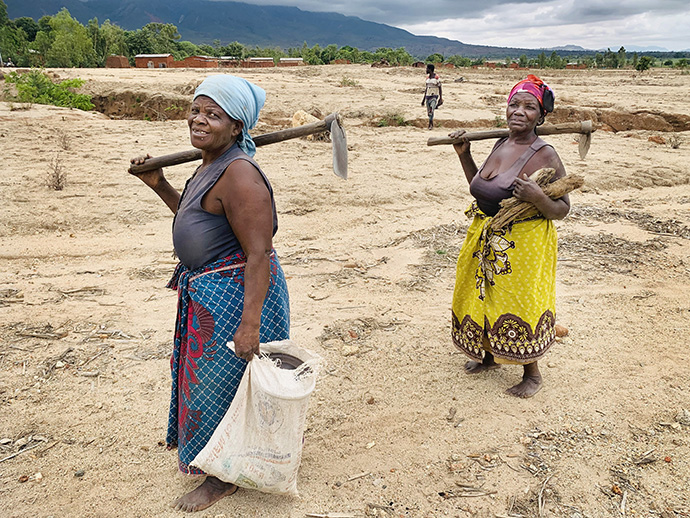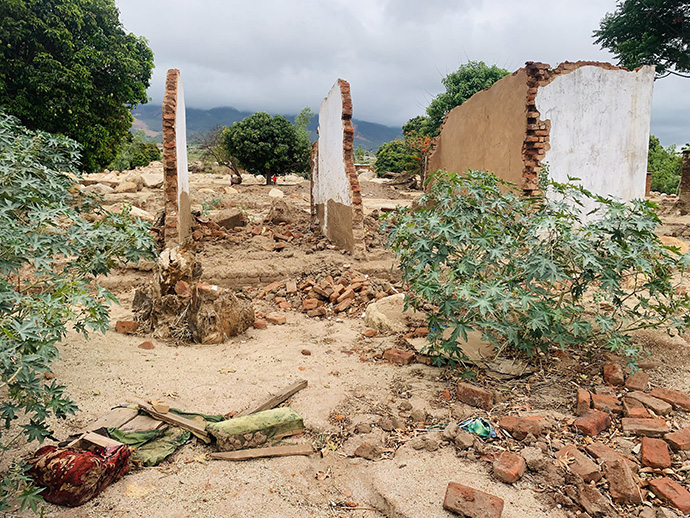Key points:
- With a $50,000 grant from the United Methodist Committee on Relief, the Malawi Provisional Conference is supporting communities affected by Cyclone Freddy.
- The March cyclone killed more than 1,000 people in the country and displaced more than 560,000 in 14 districts.
- The church is providing agricultural training and equipment and helping reconstruct community infrastructure.
A $50,000 grant from the United Methodist Committee on Relief is helping Cyclone Freddy survivors in Malawi rebuild their lives.
The March 2023 cyclone killed more than 1,000 people in the country and displaced more than 560,000 in 14 districts. Additionally, more than 125,000 households lost their means of livelihood, including homes, crops, livestock, public infrastructures, schools, health facilities and places of worship.
“The cyclone left a trail of destruction, taking with it not just homes and livelihood, but also memories and loved ones,” said survivor Chimwemwe Sambani. “I will forever carry the pain of losing my 3-year-old daughter and 3-month-old son, and the trauma of that fateful night.”
In response to immediate needs, the Malawi United Methodist Church, along with the government and nongovernmental associations, provided food, sanitary items, medicine, utensils and materials for temporary shelters. Now that camps that accommodated displaced people have been closed, survivors have the daunting task of rebuilding their lives.
With the grant money, the Malawi Provisional Conference has embarked on aid that strives to support those households, providing agricultural training, irrigation equipment, livestock and assistance in reconstructing community infrastructure.
“Even our hospital, which held crucial data and property, was not spared,” said Dixy Khando, Nkhulambe Health Center medical assistant. “As we wait for the hospital to be reconstructed, having access to necessities like toilets is crucial. We are grateful for the support of sanitary facilities that are coming from this project.”
United Methodist Pastor Stanley Ntchafu, who is charge of the Phalombe Circuit, said the impact of Cyclone Freddy has been devastating.
“Our Nkhulambe Church’s nursery school lost 20 students … The rebuilding of the church and the school will mean so much to these grieving families.”

Rebecca Navaya said the support from The United Methodist Church gives survivors like her hope.
“We have been living day by day, without any hope of restoring the things we lost,” she said. “The support coming through this project gives us hope that we can rebuild our lives, starting with regaining livestock and irrigation crops.”
Damiano Chimangeni agreed. “This project is like a beacon of hope for us. Now we have the necessary tools coming from this project to start afresh: seeds, water pumps and watering cans.”
According to government reports, Cyclone Freddy severely affected some 125,000 households in the Nsanje, Phalombe and Machinga districts. The aid will impact 900 households directly through agricultural productivity, benefiting 600 farmers with crop and livestock productivity.
“The project focuses on equipping farmers with the necessary skills and resources to enhance crop productivity,” said volunteer Kephus Mtambo. “Through training and seed packages, we aim to empower 600 farmers with organic fertilizer-making techniques and provide them with early-maturing maize seed, sweet potato vines and vegetables.”
Maurice Solola, acting health coordinator for the Malawi Provisional Conference, said the aid will help survivors long-term.
“To ensure efficient irrigation, 300 household farmers will receive motorized pumps or watering cans,” he said. “Another 300 households will benefit from a livestock pass-on scheme, which involves receiving goats. These initiatives will not only support livelihood recovery but will also enhance food security for the beneficiaries.”
He said the response, which is expected to last five months, has a broader goal of improving community access to vital resources and assets.
“We plan to construct three worship sanctuaries and a sanitary facility for a health center. This will greatly benefit approximately 10,000 people in our targeted communities, providing spaces for solace, encouragement and meeting health care needs,” Solola said.

About 20% of the UMCOR grant will be dedicated to the purchase of material to supplement bricks and sand already provided by the local community for the rehabilitation of the damaged infrastructures.
The impact of the aid will be significant, said the Rev. Ephraim Kambona, Malawik Southern District superintendent, noting that the initiative will generate income, improve living conditions and offer spiritual support to communities in need.
“To ensure inclusivity and reach those most in need, the project will specifically target the vulnerable, including female-headed households and the elderly,” Kambona said. “We aim to identify areas that have been reached least by the government and other organizations, extending our support to those who require it most.”
Nkhoma is a communicator for the Malawi Provisional Conference of The United Methodist Church.
News media contact: Julie Dwyer at (615) 742-5470 or [email protected]. To read more United Methodist news, subscribe to the free Daily or Weekly Digests.




